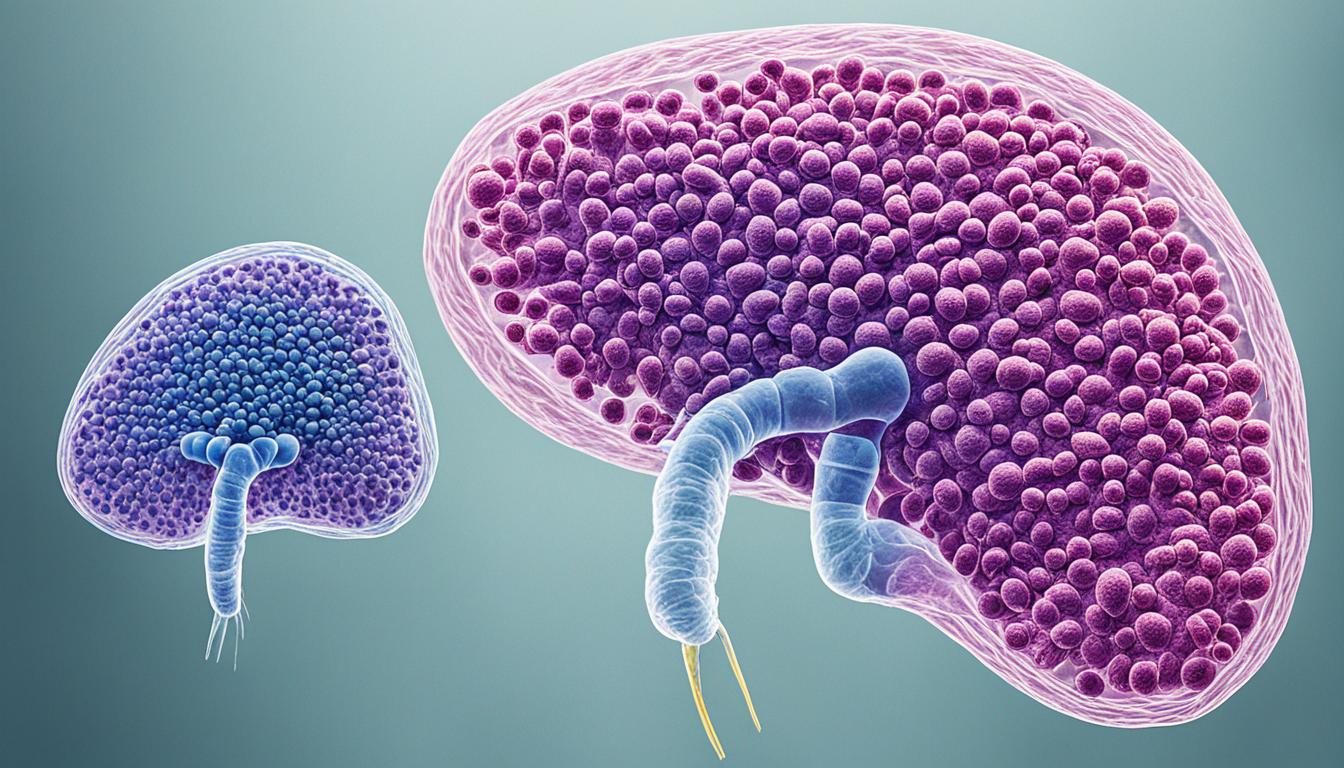Gilbert syndrome is a rare inherited disorder that affects how the body breaks down bilirubin. It affects about 3-7% of people. This leads to mild jaundice because of high bilirubin levels.
The syndrome is caused by a liver issue. This liver problem stops bilirubin from being broken down right. In those with Gilbert syndrome, the body lacks an enzyme needed to process bilirubin. This causes a type of bilirubin to build up in the body.
Things like stress, not eating, alcohol, and cold weather can make bilirubin levels go up. But here’s the thing: Gilbert syndrome usually doesn’t need treatment. Most people with it don’t have any symptoms or health issues that are serious.
However, those with Gilbert syndrome might have a higher chance of getting gallstones. They could also react badly to some drugs. So, getting checked by a doctor regularly is important.
Key Takeaways:
- Gilbert syndrome is a rare condition inherited by 3-7%.
- It causes high bilirubin levels and mild jaundice.
- The liver doesn’t process bilirubin correctly in this syndrome.
- People with it lack an enzyme for bilirubin breakdown.
- Things like stress or not eating can raise bilirubin levels.
- Although it usually doesn’t need treatment, Gilbert syndrome can lead to gallstones and sensitive reactions to some medicines.
“Causes and Inheritance of Gilbert Syndrome”
Gilbert syndrome is a genetic liver disease. It affects how the body breaks down bilirubin. This happens due to a gene mutation that makes us produce less of a certain enzyme. This enzyme helps process bilirubin and keep its levels normal.
This syndrome is inherited when both parents carry a faulty gene. If the child gets a bad gene from each parent, they will have Gilbert syndrome. Having just one bad gene means you’re a carrier. Carriers don’t get sick but can pass the gene to their kids.
Understanding Autosomal Recessive Inheritance
To have Gilbert syndrome, you need two bad genes, usually from your parents. This happens in certain families. If both parents are carriers, each child they have might be affected with a 25% chance each time.
Usually, carriers don’t show any symptoms of Gilbert syndrome. But knowing you carry the gene is crucial for family planning. It helps to understand the risk of passing on the disorder to your children.
“Symptoms and Diagnosis of Gilbert Syndrome”
Gilbert syndrome is a genetic liver issue. It often shows through mild jaundice – a yellow skin and eyes whites. Not everyone with Gilbert syndrome sees these signs. Other possible signs are dark pee, pale stools, tiredness, weak muscles, upset tummy, sickness, and diarrhea. But, these signs might be blamed on stress, not just high bilirubin levels.
To find if someone has Gilbert syndrome, doctors do blood tests. These tests check for too much bilirubin. They might do these tests while looking into other health problems or during check-ups. A sure diagnosis involves genetic tests. They look for specific genetic changes tied to the syndrome. Doctors might also do other tests to make sure it’s not another liver problem that needs treating.
In the next section, we will explore the management and prognosis of Gilbert syndrome, including treatment options, the risk of medication sensitivity, and the potential complications associated with the condition.
“Management and Prognosis of Gilbert Syndrome”
Gilbert syndrome is a mild disorder. It doesn’t often need treatment. It doesn’t show many symptoms or problems either. But, those with this syndrome can manage it to avoid jaundice. They should keep stress low and stay well-hydrated. Also, be careful with certain medicines that might make jaundice worse.
People with Gilbert’s might develop gallstones. Watching for symptoms is key. Seek help from a doctor when needed. The outlook for those with this syndrome is usually good. They often live longer than average. This might be because the substance causing jaundice has some protective features against diseases.
Even with a good prognosis, those with Gilbert syndrome should focus on their health. Regular check-ups and following medical advice are vital. This can help catch and treat any health problems early. Gilbert syndrome can be managed well with lifestyle changes and doctor guidance.
FAQ
Q: What is Gilbert syndrome?
A: Gilbert syndrome is a rare inherited disorder. It impacts how the body handles bilirubin. This leads to high bilirubin levels and sometimes mild yellowing of the skin and eyes.
Q: What causes Gilbert syndrome?
A: This syndrome comes from a gene-linked liver issue. It makes the liver not work well with the bilirubin UDP glucuronosyltransferase enzyme. This results in a mild increase of bilirubin.
Q: What are the symptoms of Gilbert syndrome?
A: The main sign of Gilbert syndrome is a slight yellowing of the skin and eyes. You might also have dark urine and pale stools. Other signs include feeling tired, weak, stomach pain, and digestive issues.
Q: How is Gilbert syndrome diagnosed?
A: Doctors usually find Gilbert syndrome through routine blood tests. These tests might not look normal. Genetic testing can give a clear answer.
Q: Does Gilbert syndrome require treatment?
A: No, Gilbert syndrome does not usually need treatment. It generally doesn’t cause problems. But those with it should watch their stress levels and drink plenty of water. They should also be careful with certain medicines, which could make symptoms worse.
Q: What is the prognosis for individuals with Gilbert syndrome?
A: Those with Gilbert syndrome often live a long, healthy life. The body’s bilirubin might even help protect the liver. Still, regular doctor visits and advice are key to staying healthy.

